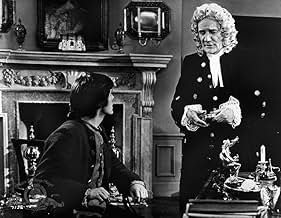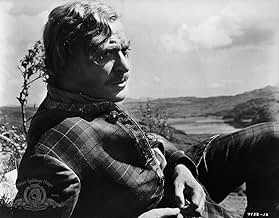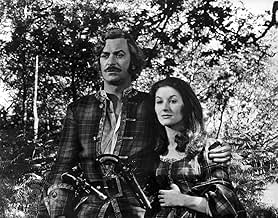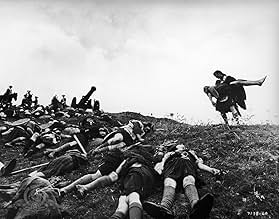Adicionar um enredo no seu idiomaIn eighteenth century Scotland, during the Jacobite Rebellion, David Balfour claims his inheritance from his uncle who has him shanghaied on a ship where David meets fugitive Jacobite rebel ... Ler tudoIn eighteenth century Scotland, during the Jacobite Rebellion, David Balfour claims his inheritance from his uncle who has him shanghaied on a ship where David meets fugitive Jacobite rebel Alan Breck.In eighteenth century Scotland, during the Jacobite Rebellion, David Balfour claims his inheritance from his uncle who has him shanghaied on a ship where David meets fugitive Jacobite rebel Alan Breck.
- Direção
- Roteiristas
- Artistas
- Direção
- Roteiristas
- Elenco e equipe completos
- Produção, bilheteria e muito mais no IMDbPro
Avaliações em destaque
Those times being the days after the Battle Of Culloden where the Scottish people chose between the returning French speaking Bonnie Prince Charlie and the Hanover monarchy of George II in 1745. At Culloden the Stuart forces were destroyed and the Hanoverians firmly in control after that. Those were bad times to be a Highlander and a supporter of the Stuarts.
Lawrence Douglas plays young David Balfour and Michael Caine is Alan Breck his friend and rescuer during the kidnapping of young Balfour by Captain Jack Hawkins at the behest of Balfour's uncle Donald Pleasance.
I'll not say more as the story of Kidnapped is well known. As for the continuing material from Catriona, the differences between Alan Breck and David Balfour are brought out. Lawrence Douglas is a Hanoverian supporter and Breck a soldier in the army of Prince Charles. However Douglas is an honest young man and goes to bat for a Stuart accused of a crime he did not commit. That sets the rival Campbell clan against him and puts Advocate General Trevor Howard in a delicate position.
Howard's character is not in the first novel and he's a decent man in an impossible political position. It's Alan Breck however who sets things right in the end for all concerned.
Previous versions with Warner Baxter and Freddie Bartholomew and Peter Finch and James MacArthur only concentrated on the Kidnapped story. The Finch/MacArthur version was from Disney and marketed for kids. This film is more adult and firmly set in the politics of the time with a good ensemble cast. I'd check this out especially if I liked the work of Robert Louis Stevenson.
One reviewer wrote all about how the battle was between Scottish and English (they were offended by the use of the word 'British' by some reviewers), but that isn't exactly correct. Some Scottish troops fought with the English and there would have also likely been Welsh and Irish troops fighting with them as well (nations the English had long before subjugated). As for the Jacobite Scottish, they apparently had a few English and Irish with them...very few and they were mostly Catholics who did not want Anglicanism imposed on them by the Church of England. The odds were definitely stacked against the Jacobites...and the loss seems, in hindsight, rather inevitable. Today, many in Scotland STILL mourn the loss at Culloden....but on to my actual review!!
The story begins just after this climactic battle, with a rather naive David Balfour arriving at his uncle's home in the border country to claim his inheritance. It' pretty obvious the uncle isn't a kind man and, in fact, he tries to arrange for David's 'accidental' death....though the young man manages to survive. Now you'd THINK David would throttle the elderly uncle or he'd leave the home and seek the law, but instead he foolishly stays the night. Not surprisingly, when morning arrives, the uncle has arranged for David to he 'shanghaied' aboard a sailing vessel headed for the Carolinas. But before he can be forced there, the ship stops to pick up a Scottish patriot, Alan Breck (Michael Caine)...and they plan on also robbing him and taking him to the American colonies. Fortunately, Breck and Balfour are able to prevent this and they escape from the ship and head back to Scotland. What's next? See the film...or just read the book...as the book is among Stevenson's best works (I actually like it better than his more famous "Treasure Island").
While Michael Caine seems okay in the lead, you do wonder why the story wasn't done with a Scottish actor. While most Americans, like me, probably wouldn't notice, I am pretty sure Brits noticed this casting decision.
So apart from the casting of Caine (which is NOT a serious issue for me), is the film any good? Well, considering the Stevenson source material is so good, it's hard to dislike the movie. Plus, it actually was filmed in Scotland unlike some versions of the story. I liked the lovely music as well...very moving and fitting to the story. All in all, a very good version of the story...along with some of its sequel tossed in as well.
Whatever the rights and wrongs (ethically speaking) of the breakup of the old clan system in the Scottish Highlands, and the claims of the Jacobite Succession, it is just plain wrong (factually speaking) to refer to the English as the "British" by contrast with the Scots. The term British refers to anyone who was a subject of the British Crown, subsequent to the Act of Union of 1707; it can refer indifferently to Scots, Welsh, English and Northern Irish, and historically (prior to Home Rule) to the Irish generally.
There may be some sentimentality on the part of American viewers who, mindful of their own War of Independence, wish to identify with others struggling against "British" rule. But the terms British and English are not, and should not be considered, interchangeable.
(There is great ignorance about this distinction in Continental Europe as well; I have had many animated discussions with German-speakers, who have failed to distinguish between "England" and "Grossbritannien", and with Francophones, who think that the whole of "Grande-Bretagne" is also "Angleterre". This may be politically comforting, but is culturally and historically WRONG!)
The film movingly portrays a culture and political cause on the verge of destruction and the politics behind it. To a certain extent, it has to modify the plot of the two novels to effectively do so. Now it might have been nice if we could have heard the Scottish language spoken amongst the Highlanders. This absence makes it harder to portray the cultural conflict which was important both in the period and in the novels. However, we can forgive the film's makers by remembering that such was rarely done in the early 1970s.
The plot may not be entirely accurate in detail (the Appin murder, etc), but the portrayal of the Jacobite Rebellion is both very accurate and insightful, surprisingly so for a big-time film. The ending is a terrific and original attempt to convey the thoughts and psychology of a man through the medium of film.
All that aside, it is a historical adventure. One either likes that genre or doesn't. If the former, then the chances are you will like this.
The first thing that stands out from the outset here is that the cockney actor Michael Caine is starring in the role of Alan Breck, the Jacobite rebel. It seems like it must be a bit of miscasting, as it is difficult imagining Caine in such a role, however, pleasingly he is very good here and his film star charisma is used to very good effect for this particular character. The film also benefits a lot from plenty of nice on-location photography from around Scotland. It gives the whole production more of an authentic feel. The story-line is compelling and the direction is well-paced, while the events depicted are less over-the-top than in later Scottish adventures set in historical times such as Braveheart (1995) and this for me is a good thing. The story-line eventually dove-tails to a very bittersweet ending that seems like the only appropriate way to round things off.
Você sabia?
- CuriosidadesSeveral books on Sir Michael Caine have alleged that the cast and crew were not paid because of cash problems. Caine admitted this in his 1992 autobiography "What's It All About?"
- Erros de gravaçãoCatriona in the getaway is wearing a blue/brown check tartan dress split up the front showing a white underskirt and a shawl. She's seen in this costume a couple of times as she, Alan Breck and David elude the redcoats but when they come across a looted cottage she's seen wearing a light brown bodice square cut across the chest and laced down the front. When they flee the cottage she's back in the tartan dress. Alan in the gateway has a belt, pistol and a long dagger. When he reaches the rear of the cottage he's also got a strap over his right shoulder to his left side with a scabard which he's lost when they leave the cottage.Alan and Catriona are given shelter by Cluny who tells his wife to give Catriona fresh clothes as her tartan dress is torn. The following morning she's seen in the tartan dress and Alan with the sword belt. The sequences have obviously been wrongly edited.
- Citações
Alan Breck: You should not be thinking of your father now, but Scotland. Scotland, lassie, do you know what that means?
- ConexõesFeatured in Dream Me Up Scotty! (2013)
Principais escolhas
- How long is Kidnapped?Fornecido pela Alexa
Detalhes
Contribua para esta página


































